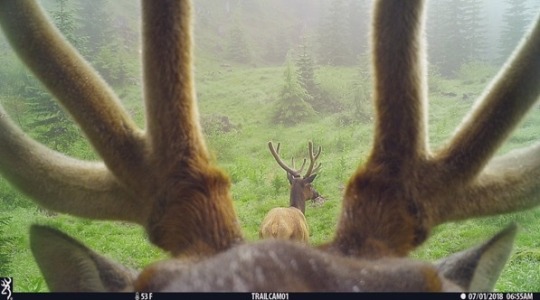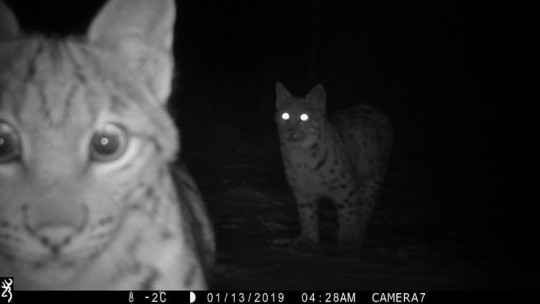#trail cams
Explore tagged Tumblr posts
Text

via trailcam
2K notes
·
View notes
Text
The backyard is full of baby birds, and they all come down to the pond. Here's a Baltimore Oriole with two young ones. A Rosebreasted Grosbeak watches on, his offspring came later. This clip I recorded with a CY95 trailcam. I'm fairly new to trailcams but I love the video quality, and that it comes with a solar panel!
#birds#backyard birds#Baltimore Oriole#Orioles#baby birds#Rosebreasted Grosbeak#grosbeaks#bird bath#trail cams#birds of michigan#birdlovers#birds of north america#nature#birdwatching#Ostdrossel
744 notes
·
View notes
Text

137 notes
·
View notes
Text
A compilation of our slightly disabled coyotes, not that they let it affect them! We've got at least three of them around, maybe even more!
I love whenever these guys show up, but I always wonder how they end up that way? A natural injury? Simply born with a malformation? Or maybe caught in a human made trap?
Whatever the reason these fellas just aren't giving up!
31 notes
·
View notes
Text

#trailcams#trail camera#animal photography#trail cam footage#trail cams#photography#animals#painting#fox#wild animals#wildlife#fyp#tumblr fyp#lgbtqia#aesthetic#poemsociety#poems and quotes#poems on tumblr#poems and poetry#love poems
27 notes
·
View notes
Text





Mormon Jesus would've cruised in the temple washroom too
#transgender#mormon gothic#southern gothic#midwest gothic#southern aesthetic#midwest#southern alberta#calgary#cowboy gothic#trail cams#gay#art#deers#meat talk#jesus#momon jesus
87 notes
·
View notes
Text
FUCK, Romeo and Juliet. I want what these bitches have

The fucking love in his eyes
11 notes
·
View notes
Text

15 notes
·
View notes
Text
Trail cam catching a deer fawn with the zoomies
170K notes
·
View notes
Note
Hi, my next art assignment is a landscape painting, would you be okay if I used one of the pictures from this post as a reference? https://www.tumblr.com/eviltherianblog/755995660259573760/some-of-my-favorite-deer-trail-cam-footage?source=share
No worries if not! I just need some kinda written evidence of you being okay with it if you are because of portfolio copyright stuff
Have a great day! :)
Hi! unfortunately I do not own any of these pictures, however the owners of them (who I can not name anymore, so ultimately this information won't be useful) have consented to their redistribution AS LONG AS there is no monetary gain from it, if I remember correctly. As I have no proof of this being true I would rather not use these pictures for reference - what I can do is give you some sources for finding high quality, beautiful trailcam footage.
-trailcampro on youtube -browning trail camera -Maine Wildlife trail videos on youtube -NYup -"Louis the Pretty Bird & Friends" -Mitten Trail Cams on youtube -Eastern Oregon Trail Camere -Valley Trail Cams -Tim Harrell -Swan River Wildlife Almanac -Yukon Wildlife Cams on youtube -Once upon a Forest -Wyoming Game and Fish Department -Micheal Outside -People and Carnivores -Tom Hartwell Wildlife Cameraman -Ecofact -Wyoming Migration Initiative -Trail Cam Guy
0 notes
Text

141 notes
·
View notes
Text
A comical series of events caught on the trail cam!
#theyre so silly#last guy almost got his lunch too#animals#nature#critters#birds#wild life#wildlife#mammals#squirrel#gray squirrel#hawks#raptor#red shouldered hawk#trail cams#mine
22 notes
·
View notes
Text

Allegory of Divine Providence and Barberini Power
#artwork#art#renaissance#old art#deer photography#greek mythology#mythology and folklore#mystical#animal photography#photography#painting#paintings#trailcams#trail camera#trail cam footage#trail cams#animals
12 notes
·
View notes


